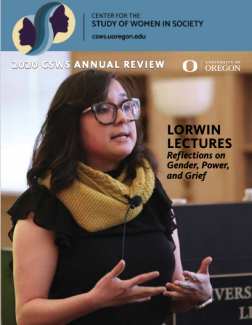Features:
- 2019-2020 Year in Review: A Letter from the Director by Michelle McKinley, Director, CSWS
- Supporting Women of Color at UO by Sangita Gopal, Associate Professor, Department of Cinema Studies
- “She Was a Terrific Advocate”: Joan Acker Inspired Alumnus’ Career and Lifelong Connection to CSWS by Jenée Wilde, Dissemination Specialist, CSWS
- Writing A Death in Harlem: A Conversation with Karla Holloway, Interview by Ulrick Casimir, Career Instructor, Department of English
- Reflections on Gender, Power, and Grief
Faculty Research:
- The Alaska Mental Health Act: Tracing the Development of Public Health and the Nation-State by Kristin Yarris, Associate Professor, Department of Global Studies
- Food Under Fascism by Diana Garvin, Assistant Professor, Department of Romance Languages
- The “Loophole of Retreat”: Seclusion, Privacy, and the Intimate Geographies of Black Life by Faith Barter, Assistant Professor, Department of English
- How I Gained 100 Japanese Grandmothers: Reflections on Intergenerational Conversation Inspired by CSWS by Alisa Freedman, Professor, Department of East Asian Languages and Literature
Graduate Student Research:
- “The Struggle Continues”: Gender-Based Violence and the Politics of Justice and Care in Brazil by Emily Masucci, PhD Candidate, Department of Anthropology
- “Two Sides of the Same Story”: Colonial Violence and Erasure in the University of Oregon’s (Fallen) Pioneer Statues by Marc J. Carpenter, PhD Candidate, Department of History
- In the Name of Honor? Evaluating the Impact of Weather Variability on “Honor” Killings in Pakistan by Amna Javed, PhD Candidate, Department of Economics
- The Work of Black Feminist Liberation: Writing Erotic Freedom in Black Feminist Fiction and TV by Carmel Ohman, PhD Candidate, Department of English
- Radical Korean Feminism: Women’s Movement Seeks to #escapethecorset by Jane Nam, PhD Candidate, Department of Philosophy
- Witch-Hunting in Colonial Assam by Daizi Hazarika, PhD Candidate, Department of Anthropology
Highlights from the Academic Year:
- News & Updates
- 2020-21 CSWS Research Grant Award Winners
- Black Thought Matters: Two Online Collections from Hypatia celebrate Juneteenth
- CSWS Website Gets a Facelift
- Looking at Books
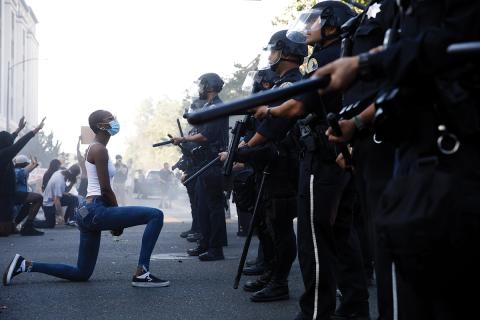
2019-2020 Year in Review: A Letter from the Director
Dear Friends,
The year in review feature is generally an easy column for the Director to write. As the title suggests, I look back with a sense of pride and satisfaction at a year of successful events, celebrate our guest speakers who sparked insightful conversations, and chronicle our community-building activities that strengthened our bonds as feminist scholars on campus. This year suspends all expectations. I even tried to find a "natural" point of pause to begin this retrospective. There simply wasn't an end to the daily onslaught of misery in these times.
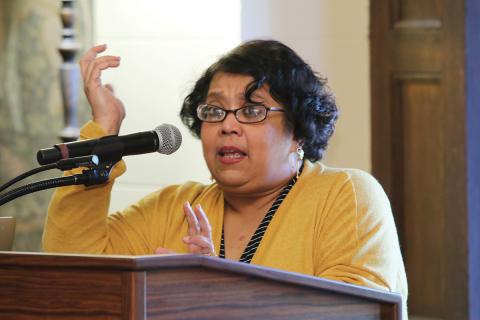
Supporting Women of Color at UO: A Look into the Center's Long-Running Faculty Mentorship Program
by Sangita Gopal, Associate Professor, Department of Cinema Studies
The Women of Color (WOC) Project has been a special project under the auspices of CSWS since 2005. The program is comprised of tenure-track women faculty, and our collective has approximately 50 participants, of whom about 30 are active constituents. We represent all the colleges and schools within the UO.

“She Was a Terrific Advocate”: Joan Acker Inspired Alumnus’ Career and Lifelong Connection to CSWS
by Jenée Wilde, Dissemination Specialist, CSWS , Senior Instructor, Department of English
Thomas Beaumont (Class of ’69) first met Professor Joan Acker as an undergraduate sociology and social welfare student at University of Oregon.

Writing A Death in Harlem: A Conversation with Karla FC Holloway
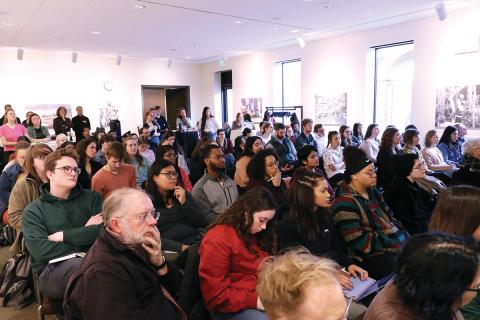
Reflections on Gender, Power, and Grief: The 2019-2020 Lorwin Lectureship on Civil Rights and Civil Liberties
Introduction by CSWS Director and Bernard B. Kliks Professor of Law Michelle McKinley, School of Law
The Alaska Mental Health Act: Tracing the Development of Public Health and the Nation-State
by Kristin Yarris, Associate Professor, Department of Global Studies

Food Under Fascism
by Diana Garvin, Assistant Professor, Department of Romance Languages

The “Loophole of Retreat”: Seclusion, Privacy, and the Intimate Geographies of Black Life
by Faith Barter, Assistant Professor, Department of English
How I Gained 100 Japanese Grandmothers: Reflections on Intergenerational Conversation Inspired by CSWS
by Alisa Freedman, Professor, Department of East Asian Languages and Literatures

"The Struggle Continues": Gender-Based Violence and the Politics of Justice and Care in Brazil
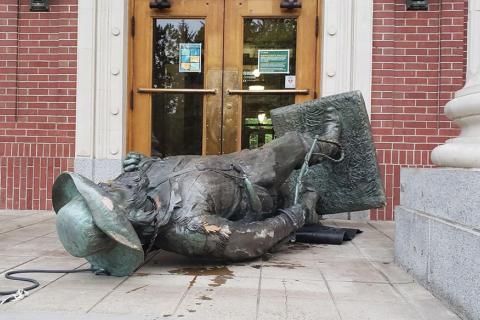
“Two Sides of the Same Story”: Colonial Violence and Erasure in the University of Oregon’s (Fallen) Pioneer Statues
by Marc J. Carpenter, Doctoral Candidate, Department of History

In the Name of Honor?: Evaluating the Impact of Weather Variability on “Honor” Killings in Pakistan
by Amna Javed, PhD Candidate, Department of Economics
Every year, approximately 5,000 women are murdered globally in the name of honor. These crimes, labeled as “honor” killings, are meant to punish transgressing individuals who are believed to have brought shame to their families by overstepping social boundaries regarding acceptable sexual freedoms. In Pakistan’s context, where the “purity” of a woman is crucial to ensuring a successful arranged marriage, dishonor might result from, among other reasons, coming home late, having an alleged affair, or eloping.

The Work of Black Feminist Liberation: Writing Erotic Freedom in Black Feminist Fiction and TV
by Carmel Ohman, PhD Candidate, Department of English

Radical Korean Feminism: Women's Movement Seeks to #escapethecorset
by Jane Nam, PhD Candidate, Department of Philosophy

Witch-Hunting in Colonial Assam
by Daizi Hazarika, PhD Candidate, Department of Anthropology


